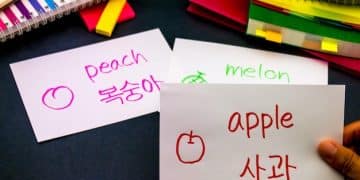K-Pop and Language Learning: Boost Your Korean Skills

K-Pop and language learning are increasingly intertwined, offering a fun and effective way to improve Korean skills by exposing learners to authentic language use, cultural context, and engaging content that motivates continued study.
Want to learn Korean in a fun and engaging way? Dive into the world of K-Pop and language learning, where catchy tunes and captivating entertainment become your tools for mastering the Korean language.
The Hallyu Wave: Riding the K-Pop Trend for Language Acquisition
The Hallyu wave, or the Korean wave, has swept across the globe, bringing with it a surge of interest in Korean culture. With millions tuning in to listen to K-Pop and watch K-Dramas, a convenient entry point to learning the language has opened up. Many language learners are now leveraging this interest to embark on their Korean language learning journey.
Why K-Pop Works for Language Learning
K-Pop provides an immersive experience that traditional language learning methods often lack. The repetition of lyrics, exposure to colloquial phrases, and cultural context embedded in the music create a holistic learning environment.
- Listening to K-Pop improves auditory comprehension by training your ear to recognize Korean sounds and intonation.
- Reading K-Pop lyrics helps expand your vocabulary and understanding of sentence structure.
- Singing along with K-Pop songs enhances pronunciation and fluency.
Furthermore, K-Pop cultivates a genuine interest in Korean culture, providing the motivation to continue studying and practicing. Many learners find that their passion for K-Pop fuels their dedication to mastering the language.
In conclusion, the Hallyu wave offers a huge opportunity for language learners to learn Korean organically. It’s not only effective but also enjoyable, making the learning journey more rewarding and sustainable.

Decoding K-Pop Lyrics: Vocabulary and Grammar Lessons in Disguise
K-Pop lyrics are rich in colloquial expressions, slang, and everyday vocabulary. By carefully studying these lyrics, language learners can gain a practical understanding of how Korean is used in real-life conversations. Recognizing patterns and structures in K-Pop lyrics can translate into a more applicable understanding of grammar and sentence formation.
Breaking Down the Lyrics
To effectively use K-Pop lyrics for language learning, it’s beneficial to start with songs that have clear enunciation and relatively simple vocabulary. Once you’re comfortable with the basics, you can move on to more complex songs with faster tempos and more nuanced lyrics.
- Choose songs with lyrics available in both Korean and English.
- Read the English translation first to understand the overall meaning of the song.
- Analyze the Korean lyrics, focusing on individual words and grammatical structures.
- Use a dictionary or online resources to look up unfamiliar words and phrases.
Furthermore, pay attention to the context in which the lyrics are used. Consider the emotions being expressed, the relationships between the characters in the song, and the cultural nuances that might be influencing the language.
In summary, by decoding K-Pop lyrics, language learners can unlock a treasure trove of vocabulary, grammar, and cultural insights, paving the way for a more immersive and rewarding learning experience.
Pronunciation Power-Up: Mastering Korean Sounds Through K-Pop
Korean pronunciation can be challenging for learners due to the presence of sounds that don’t exist in many other languages. K-Pop songs offer an excellent way to improve your pronunciation by providing a natural and engaging model to imitate.
Mimicking Your Favorite Idols
One of the most effective ways to improve your Korean pronunciation with K-Pop is to mimic your favourite idols. Pay close attention to how they pronounce individual words and phrases, and try to replicate their pronunciation as closely as possible.
- Listen to the same song repeatedly, focusing on specific sections or phrases.
- Record yourself singing or speaking along with the song, and compare your pronunciation to the original.
- Use online resources or language learning apps to get feedback on your pronunciation.
By consistently practicing and refining your pronunciation with K-Pop, you’ll gradually develop a more accurate and natural-sounding Korean accent. It is important to note that different regions of Korea have varying accents, so choosing a variety of artists from across the country will give you a more comprehensive view of the language.
By mastering Korean sounds through K-Pop, learners can enhance their communication skills and gain a deeper appreciation for the nuances of the language.

Cultural Immersion: Understanding Korean Context Through Music
Language and culture are inextricably linked. To truly master a language, it’s essential to understand the cultural context in which it is used. K-Pop provides a window into Korean culture, offering insights into social norms, values, and customs.
Exploring Themes and Messages
K-Pop songs often touch on themes that are relevant to Korean society, such as love, relationships, family, and social issues. By analyzing the lyrics and music videos, learners can glean valuable insights into these cultural themes.
- Pay attention to the way relationships are portrayed in K-Pop songs, including the use of honorifics and levels of formality.
- Consider the cultural significance of certain words and phrases, such as “oppa” (older brother/male friend) or “aegyo” (acting cute).
- Research the historical and social context of K-Pop songs to gain a deeper understanding of their cultural meaning.
K-Pop not only entertains but also educates, providing a unique opportunity to learn about Korean culture while improving your language skills. Some songs also address themes of self-love, acceptance, and mental health, mirroring broader societal conversations.
In that way, K-Pop facilitates cultural immersion, enhancing learners’ understanding of the language and culture.
Beyond Music: Leveraging K-Pop for Comprehensive Language Skills
K-Pop is more than just music; it’s a multimedia experience that can be leveraged to develop a wide range of language skills. From music videos and interviews to variety shows and social media, there are countless opportunities to immerse yourself in the Korean language.
Expanding Your Learning Resources
To maximize the benefits of K-Pop for language learning, it’s essential to explore a variety of resources beyond just the music itself. Watching K-Pop music videos, interviews, and variety shows can help you develop your listening comprehension skills and expose you to different speaking styles and accents.
- Subscribe to K-Pop channels on YouTube and other video platforms.
- Follow your favorite K-Pop stars on social media.
- Join online communities and forums where you can discuss K-Pop and practice your Korean with other fans.
These supplementary resources enrich the learning experience, allowing you to develop a deeper understanding of the language and culture.
In short, by leveraging K-Pop for comprehensive language skills, learners can create a well-rounded and engaging learning experience that goes beyond traditional methods.
Setting Goals and Staying Motivated: Your K-Pop Language Learning Journey
Learning a new language takes time, effort, and dedication. To stay motivated and make progress on your K-Pop language learning journey, it’s important to set realistic goals and celebrate your successes along the way.
Creating a Learning Plan
Start by setting small, achievable goals, such as learning ten new vocabulary words each week or understanding the lyrics to one K-Pop song per month. As you progress, you can gradually increase the difficulty and complexity of your goals.
- Track your progress and celebrate your achievements, no matter how small.
- Find a learning buddy or join a study group to stay accountable and motivated.
- Reward yourself for reaching your goals with something you enjoy, such as attending a K-Pop concert or buying a new album.
Most importantly, remember to have fun and enjoy the process. Learning a language should be an enjoyable experience, and K-Pop can help you make it so.
With a well-thought-out plan and a commitment to continuous learning, learners can achieve their language goals.
| Key Point | Brief Description |
|---|---|
| 🎵 Vocabulary | K-Pop lyrics expand your knowledge of words and phrases. |
| 🗣️ Pronunciation | Mimicking idols helps perfect Korean sounds. |
| 🌏 Culture | Understanding Korean context through K-Pop themes. |
| 🎯 Motivation | Enjoyable learning that helps remain focused on studies. |
FAQ
▼
Yes, K-Pop can be a very effective and enjoyable method. It immerses you in the language, exposes you to cultural nuances, and keeps you motivated through catchy tunes and engaging content.
▼
Begin by choosing your favorite K-Pop songs and looking up their lyrics in both Korean and English. Focus on understanding the vocabulary and grammatical structures, and try singing along to improve your pronunciation.
▼
Look for songs with clear enunciation and relatively simple lyrics. Many ballads and slower-tempo songs from groups like BTS, TWICE, and BLACKPINK are great starting points.
▼
Listen carefully to how your favorite idols pronounce words and phrases, and try to mimic them as closely as possible. Record yourself singing along to compare your pronunciation to the original and identify areas for improvement.
▼
Yes, K-Pop offers insights into Korean social norms, values, and customs. By analyzing the lyrics, music videos, and cultural context of K-Pop songs, you can gain a deeper understanding of Korean culture.
Conclusion
In conclusion, learning Korean through K-Pop offers a dynamic and engaging method for language acquisition. By leveraging the infectious energy of K-Pop, learners can develop comprehensive language skills while immersing themselves in Korean culture. So, turn up the volume, study those lyrics, and embark on your K-Pop language-learning journey today!





